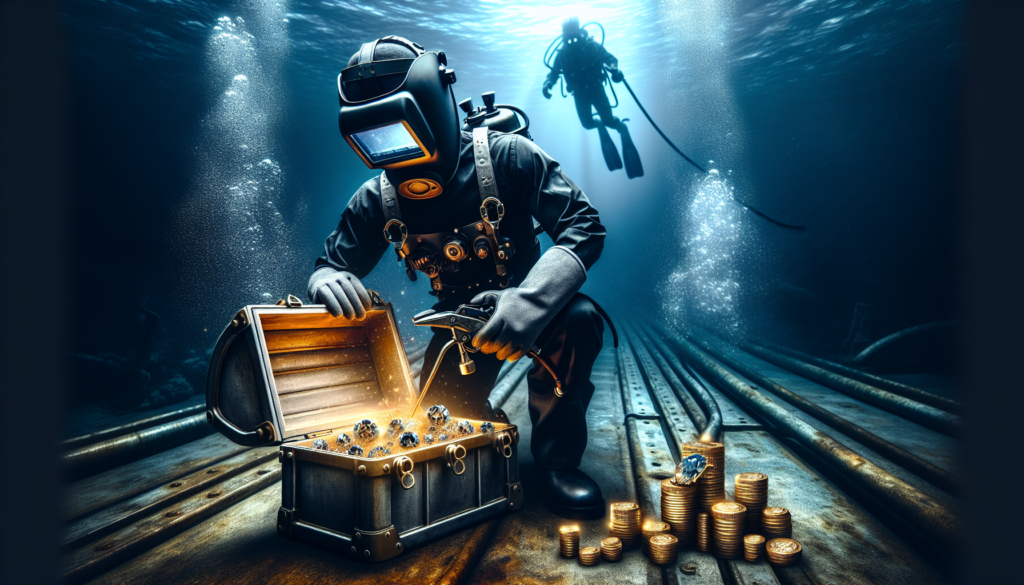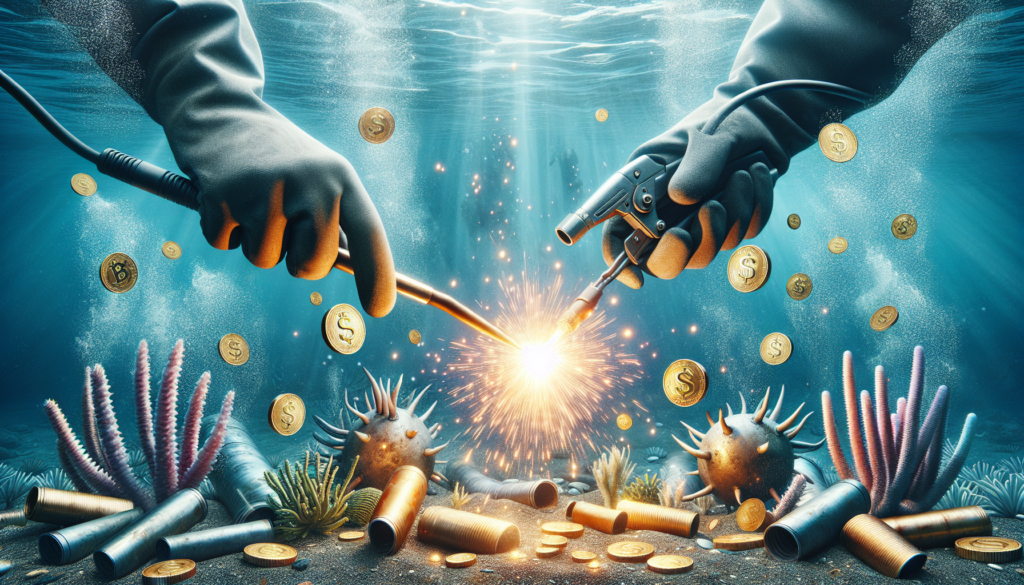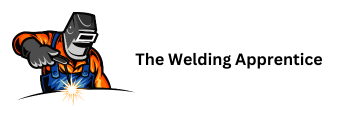Are you fascinated by the world of marine welding and interested to know how much you can potentially earn in this field? Look no further, as this article explores the captivating topic of marine welding salary. Discover the lucrative opportunities that await skilled marine welders and gain insights into the factors that influence their income. Delve into the world of marine welding and uncover the financial rewards that come with this specialized profession.
Factors Affecting Marine Welding Salary
When it comes to determining the salary in the field of marine welding, there are several key factors that come into play. These factors include the level of experience, education and certification, the industry and type of company, location, and the specific job role and responsibilities.
Level of Experience
One of the most significant factors that impact the marine welding salary is the level of experience. Naturally, entry-level welders with little to no experience can expect to earn a lower salary compared to their more experienced counterparts. As welders gain more years of experience in the industry, their skills improve, making them more valuable to employers. This can result in higher salaries and increased opportunities for advancement.
Education and Certification
Education and certification also play a crucial role in determining a marine welder’s salary. While it is possible to become a welder through on-the-job training or vocational programs, having a formal education in welding or a related field, such as metal fabrication or engineering, can lead to higher earning potential. Additionally, obtaining relevant certifications, such as those offered by the American Welding Society (AWS), can demonstrate a welder’s proficiency and dedication to their craft, making them more attractive to employers.
Industry and Type of Company
The industry and type of company that a marine welder works for can have a significant impact on their salary. Different sectors, such as marine construction, shipbuilding and repair, oil and gas, and commercial diving, offer varying levels of compensation. Industries that involve specialized welding techniques or hazardous working conditions may offer higher salaries to attract skilled welders who are willing to take on the associated risks.
Location
Location is another crucial factor that affects marine welding salary. Salaries can vary significantly depending on the region or state in which a welder is employed. For example, welders working in coastal areas with a high demand for marine welding skills may earn higher salaries due to the competition for qualified workers. On the other hand, welders in inland areas may earn lower salaries due to fewer opportunities and a lower demand for marine welding expertise.
Job Role and Responsibilities
The specific job role and responsibilities of a marine welder can also impact their salary. Different roles, such as welder-fabricator, underwater welder, marine pipe welder, or shipyard welder, may require varying levels of skill and expertise. Welders who have specialized knowledge and experience in niche areas of the industry may command higher salaries due to their unique skill set and the increased demand for their services.
Average Marine Welding Salary
It is essential to understand the average salary range for marine welders to gauge the earning potential within this profession. While salaries can vary widely based on the aforementioned factors, there are some general figures to consider.
National Average Salary
According to the Bureau of Labor Statistics, the national average annual wage for welders, cutters, solderers, and brazers was $45,250 as of May 2020. However, it is important to note that this figure represents the average salary across all industries and may not specifically reflect the earnings of marine welders.
Salary Range
The salary range for marine welders can vary depending on several factors. Entry-level welders may start with salaries around $30,000 to $40,000 per year. Mid-career welders with several years of experience can earn anywhere from $40,000 to $60,000 annually. Experienced welders who have developed specialized skills or moved into supervisory roles may earn salaries in the range of $60,000 to $80,000 or more. Late-career welders who have reached the pinnacle of their profession and have acquired extensive experience and expertise may earn salaries upwards of $100,000 per year.
High-Paying Industries
Certain industries tend to offer higher salaries to marine welders due to the unique challenges and demands of the work. The offshore oil and gas industry, for example, often pays welders a premium due to the dangerous nature of the job and the need for highly skilled individuals. Other high-paying industries include shipbuilding and repair, marine construction, and commercial diving.
Low-Paying Industries
On the other end of the spectrum, some industries may offer lower salaries to marine welders. For example, inland areas with fewer opportunities for marine welding may result in lower wages. It is also important to note that certain industries or companies in competitive markets may try to minimize costs and offer lower salaries to their welders.
The salary of marine welders is affected by various factors, and it is essential to consider these aspects when evaluating earning potential within the industry. It is crucial to keep in mind that salaries can vary significantly based on the specific circumstances and individual qualifications.

Level of Experience and Salary
As mentioned earlier, the level of experience plays a vital role in determining the salary of a marine welder. Let’s explore how different levels of experience can impact earning potential.
Entry-Level
Entry-level marine welders typically have limited or no professional experience in the field. They are often recent graduates from vocational or trade schools or individuals who have completed basic welding training programs. Due to their lack of experience, entry-level welders can expect to start at the lower end of the salary range, typically earning between $30,000 and $40,000 per year. However, as they gain experience and develop their skills, their earning potential can increase significantly.
Mid-Career
Mid-career marine welders have acquired several years of experience in the field and have likely worked in various roles within the industry. With this experience, they have honed their skills and increased their value to employers. As a result, mid-career welders can expect to earn higher salaries, ranging from $40,000 to $60,000 per year. Their expertise and ability to take on more complex welding projects contribute to their increased earning potential.
Experienced
Experienced marine welders have spent a considerable amount of time in the industry, typically exceeding ten years. They have a wealth of knowledge and experience, often specializing in specific welding techniques or industries. Due to their expertise, experienced welders command higher salaries, ranging from $60,000 to $80,000 or more annually. Their advanced skill set and ability to handle complex welding projects make them valuable assets to employers.
Late-Career
Late-career marine welders have reached the pinnacle of their profession. With extensive experience and specialized knowledge, they often take on supervisory or leadership roles within the industry. Late-career welders are highly sought after due to their skill set and expertise, and their earning potential can exceed $100,000 per year. These individuals have spent years perfecting their craft and are often responsible for training and mentoring younger welders.
Education and Certification Impact on Salary
Marine welders’ education and certification can have a significant impact on their earning potential within the industry. Let’s delve into the importance of education, certification requirements, additional certifications, and the benefits they provide.
Importance of Education
While it is possible to enter the field of marine welding through on-the-job training or vocational programs, having a formal education in welding or a related field can enhance a welder’s skills and earning potential. A formal education provides a comprehensive understanding of welding techniques, safety regulations, and the properties of different metals and alloys.
By obtaining a degree or diploma in welding or a related field, welders can showcase their commitment to their craft and their dedication to gaining a strong foundation of knowledge. This can make them more attractive to employers who value well-rounded welders with a solid educational background.
Certification Requirements
In addition to formal education, obtaining relevant certifications is highly beneficial for marine welders. The American Welding Society (AWS) offers various certifications that are widely recognized in the industry. These certifications validate a welder’s skills and knowledge in specific welding techniques and processes.
Some employers may require certification as a prerequisite for employment, while others may offer higher salaries or preferentially hire certified welders. Certification requirements can vary based on the industry and specific job requirements, but generally, achieving certification demonstrates a welder’s competence and dedication to their craft.
Additional Certifications
In addition to the basic certifications provided by the AWS, there are several specialized certifications that marine welders can pursue to enhance their skills and earning potential. These additional certifications focus on specific welding techniques, such as underwater welding or pipe welding, and allow welders to specialize in niche areas of the industry.
By obtaining these additional certifications, welders can position themselves as experts in their chosen field and demand higher salaries due to their unique skill set. These certifications demonstrate a level of mastery and dedication that employers value, leading to increased earning potential.
Certification Benefits
Obtaining certifications as a marine welder offers numerous benefits beyond the potential for higher salaries. Certifications provide a recognized standard of proficiency in the industry, giving welders a competitive edge when applying for jobs or bidding on projects. Additionally, certifications can help ensure safety on the job by promoting adherence to industry-recognized best practices and standards.
Certifications also allow welders to network with other professionals in their field, opening doors to collaboration, mentorship, and further skill development. Furthermore, some employers offer financial incentives, such as higher salaries or bonuses, to certified welders. These benefits make investing in certifications an attractive option for marine welders looking to advance in their careers and increase their earning potential.

Industry and Type of Company
The industry and type of company that a marine welder works for can significantly influence their salary. Let’s explore how various sectors within the marine welding industry can impact earning potential.
Marine Construction
Marine construction involves the building and maintenance of structures and facilities in marine environments, such as ports, piers, and offshore platforms. Welders employed in the marine construction sector may work on projects ranging from small-scale dock repairs to large-scale infrastructure development.
The marine construction industry often requires specialized welding techniques and knowledge of marine-specific materials and regulations. As a result, marine construction companies may offer higher salaries to attract welders with the necessary skills and expertise. The demand for marine construction projects and the associated hazards of working in marine environments contribute to the increased earning potential in this sector.
Shipbuilding and Repair
Shipbuilding and repair is another sector within the marine industry that offers opportunities for marine welders. This sector involves the construction, maintenance, and repair of ships, ranging from small boats to large commercial vessels.
Shipbuilding and repair require welders to possess specialized skills in working with specific materials, such as steel and aluminum, as well as a deep understanding of ship construction principles. Due to the complexity of the projects and the high standards required for ship safety, welders in this sector may command higher salaries.
Oil and Gas
The oil and gas industry is known for offering lucrative opportunities for marine welders. This sector involves the exploration, extraction, and transportation of oil and gas reserves from offshore platforms or rigs.
Working in the oil and gas industry as a marine welder often entails performing maintenance and repair on pipelines, subsea equipment, and offshore structures. The demanding nature of the work, combined with the hazardous working conditions, often results in higher salaries for welders in this sector. The need for highly skilled welders who can handle the unique challenges of working in offshore environments contributes to the increased earning potential.
Commercial Diving
Commercial diving is another area within the marine industry that relies heavily on the expertise of marine welders. Commercial divers perform a variety of tasks, including welding and underwater construction and repair.
Welders who specialize in underwater welding can find lucrative opportunities in the commercial diving sector. However, this line of work comes with its own set of risks and challenges, including working in confined spaces and dealing with high water pressures. Due to the specialized nature of the work and the associated risks, commercial diving companies may offer higher salaries to attract qualified and experienced marine welders.
The industry and type of company that a marine welder works for can significantly impact earning potential. It is important for aspiring and current marine welders to consider the specific requirements and demands of each sector when evaluating their career options and salary expectations.
Location and Salary
Location is a key factor that affects marine welding salary. Let’s explore how different locations can impact earning potential for marine welders.
State-wise Salary Variations
Salaries for marine welders can vary significantly from one state to another. Factors such as demand, competition, and cost of living all influence the earning potential in different regions. For example, states with a strong maritime industry and a high demand for marine welders, such as Louisiana, Texas, and Florida, may offer higher salaries compared to states with fewer opportunities in the field.
It is important for marine welders to research the salary trends and cost of living in different states before considering a job opportunity. By understanding the market conditions and living expenses, welders can make informed decisions about their career path and potential earnings.
Coastal vs. Inland Salaries
Another aspect to consider when evaluating location is the difference in salaries between coastal and inland areas. Coastal regions with a strong maritime industry and a high demand for marine welders often offer higher salaries due to the competition for skilled workers. On the other hand, inland areas may have fewer opportunities for marine welding and, as a result, lower salaries.
Coastal regions, such as the Gulf Coast in the United States, can be particularly attractive for marine welders looking for higher earning potential. These areas are known for their shipbuilding, offshore oil and gas, and marine construction industries, which often offer well-paying positions for experienced welders.
International Opportunities
In addition to considering domestic salary variations, marine welders may also explore international opportunities. The demand for skilled welders exists worldwide, and there are numerous countries that offer competitive salaries and employment opportunities for marine welders.
Popular destinations for international marine welding careers include countries with a strong maritime industry, such as Norway, the United Kingdom, Canada, and Australia. These countries often have well-established offshore oil and gas industries and shipbuilding sectors, which require skilled marine welders. It is important for welders considering international opportunities to research the specific requirements, work visa regulations, and cost of living in each country before making a decision.
Cost of Living Considerations
When considering earning potential, it is vital to take into account the cost of living in a given location. The cost of housing, transportation, healthcare, and other living expenses can vary significantly between regions, impacting the overall quality of life.
While a higher salary may be enticing, it is essential to ensure that the expenses in a particular location are proportionate to the earnings. Welders should research the cost of living in their desired areas and consider how their salaries will cover their financial needs and provide a comfortable standard of living.
Considering the impact of location on salary is crucial for marine welders looking to maximize their earning potential. Evaluating the state-wise salary variations, coastal versus inland opportunities, international options, and cost of living considerations can help welders make informed decisions about their career path and potential earnings.

Job Roles and Responsibilities
Various job roles and responsibilities exist within the field of marine welding. Each role comes with its unique set of requirements and demands, which can impact earning potential.
Welder-Fabricator
A welder-fabricator combines the skills of a welder and a metal fabricator. In addition to welding, they are responsible for interpreting blueprints, taking measurements, and fabricating metal components. Welder-fabricators may work on a wide range of projects, including marine structures, portable ship decks, and offshore platforms.
Welders in this role should possess a strong understanding of welding techniques, knowledge of different metals and alloys, and the ability to read and interpret complex blueprints. With the combination of welding and fabrication skills, welder-fabricators can often command higher salaries due to their versatility and ability to perform multiple tasks.
Underwater Welder
Underwater welding is a specialized field within marine welding that involves performing welding tasks in underwater environments. Underwater welders are responsible for conducting repairs and maintenance on various structures, such as oil and gas platforms, bridges, and pipelines.
Working as an underwater welder requires a unique skill set that includes proficiency in both welding techniques and commercial diving. Underwater welders must possess the ability to work in challenging conditions, complete tasks under high water pressures, and follow strict safety protocols.
Due to the specialized nature of the work and the risks involved, underwater welders often earn higher salaries compared to welders in other roles. The demand for certified and experienced underwater welders, coupled with the necessary training and equipment, contributes to the increased earning potential in this field.
Marine Pipe Welder
Marine pipe welders specialize in welding pipes and tubing for marine-related structures and systems. They are responsible for fabricating and installing pipes in shipbuilding, offshore drilling, and marine construction projects.
Skills required for marine pipe welding include a thorough understanding of welding techniques specific to pipe welding, the ability to interpret piping diagrams and schematics, and proficiency in working with materials such as steel, stainless steel, and aluminum.
Marine pipe welders often work on intricate projects that require precision and attention to detail. Due to the specialized skills and knowledge required, marine pipe welders can command higher salaries within the industry.
Shipyard Welder
Shipyard welders play a crucial role in shipbuilding and repair. They are responsible for welding various components of ships, including hulls, decks, and interior structures. Shipyard welders must possess a deep understanding of ship construction principles, knowledge of marine-specific materials, and the ability to read and interpret complex ship blueprints.
The work of shipyard welders is essential to ensure the structural integrity and safety of ships. Due to the specialized knowledge and skills required, shipyard welders often earn higher salaries within the shipbuilding and repair industry.
Understanding the different job roles and responsibilities within marine welding is essential when evaluating earning potential. Welders considering a particular job role should assess the specific skills and qualifications required for the position and research the associated salary trends within their industry.
Benefits and Perks
In addition to competitive salaries, marine welders often enjoy several benefits and perks that can further enhance their compensation package. Let’s explore some of the common benefits offered to marine welders.
Health and Retirement Benefits
Many employers in the marine welding industry provide health and retirement benefits to their employees. These benefits may include medical, dental, and vision insurance, as well as retirement savings plans such as 401(k) or pension programs.
Health benefits can help cover medical expenses, ensuring that marine welders have access to necessary healthcare. Retirement benefits allow welders to save for their future and provide long-term financial security.
Paid Time Off
Paid time off is an essential benefit that allows workers to take time away from their jobs for various reasons without experiencing a loss of income. Marine welders may enjoy paid vacation days, sick leave, and holidays, depending on their employer.
Paid time off provides welders with the opportunity to relax, recharge, and spend time with family and loved ones. It also ensures that they have the flexibility to address personal obligations and engage in leisure activities.
Union Membership
Joining a union can offer several benefits to marine welders. Unions negotiate collective bargaining agreements on behalf of their members, which often include higher wages, improved working conditions, and access to additional benefits.
Unionized welders can enjoy the security of knowing that they have the support and representation of the union in matters related to their employment. Unions also provide opportunities for ongoing training and professional development, enabling welders to enhance their skills and advance in their careers.
Travel Opportunities
Marine welding often involves travel, particularly for projects located in different ports or offshore locations. While being away from home for extended periods can be challenging, it offers opportunities for welders to explore new places and gain diverse experiences.
Depending on the employer and project requirements, marine welders may be provided with travel expenses, accommodation, and per diem allowances. Travel opportunities can broaden a welder’s skill set, expose them to different working environments, and contribute to personal and professional growth.
Benefits and perks provided to marine welders can significantly enhance their overall compensation package. Welders should consider these benefits when evaluating employment opportunities, as they can have a substantial impact on job satisfaction and overall quality of life.

Skills and Qualifications
Marine welding requires a specific set of skills and qualifications to excel in the profession. Let’s take a closer look at some of the key skills and qualifications necessary for success in this field.
Welding Techniques
Proficiency in various welding techniques is a fundamental skill for marine welders. Common techniques utilized in marine welding include shielded metal arc welding (SMAW), gas metal arc welding (GMAW), flux-cored arc welding (FCAW), and submerged arc welding (SAW).
Marine welders must have a deep understanding of these techniques, as well as knowledge of their applications and limitations. Skill in selecting the appropriate technique based on the specific project requirements and materials is critical for achieving high-quality welds and maintaining safety standards.
Blueprint Reading
Being able to read and interpret blueprints, welding symbols, and technical drawings is essential for marine welders. Blueprints provide detailed information about the layout, dimensions, and materials required for a welding project.
Welders must possess the ability to translate this information into their work, ensuring accuracy and adherence to project specifications. Proficiency in blueprint reading allows welders to understand the scope of their work and make informed decisions about welding methods and material selection.
Knowledge of Metals and Alloys
A comprehensive knowledge of metals and alloys is crucial for marine welders. Different marine environments and applications require specific types of metals and alloys with optimal corrosion resistance and strength properties.
Understanding the characteristics of different metals and alloys, such as steel, stainless steel, aluminum, and copper-nickel alloys, allows welders to select the appropriate materials for each project. Welders must also be aware of how different metals react to welding processes and how to mitigate potential issues such as distortion and cracking.
Safety Regulations
Safety is paramount in marine welding, given the hazardous nature of the work environment and the potential risks associated with welding processes. Marine welders must be well-versed in safety regulations and standards, including those established by organizations such as the Occupational Safety and Health Administration (OSHA) and the American Welding Society (AWS).
Welders must be knowledgeable about personal protective equipment (PPE), fire prevention measures, ventilation requirements, and emergency response procedures. Adherence to safety protocols ensures the well-being of welders and their colleagues, and helps maintain a safe work environment.
Possessing the necessary skills and qualifications is essential for marine welders to excel in their profession. It is crucial for welders to continuously develop their skills and stay updated with advancements in welding techniques, materials, and safety regulations to remain competitive in the industry.
Career Progression and Advancement
A career in marine welding offers several paths for progression and advancement. Let’s explore some of the options available for welders to further their careers and increase their earning potential.
Additional Training and Specializations
Continuous learning and additional training are vital for career advancement in marine welding. Welders can pursue advanced training programs and certifications to enhance their skills and expand their expertise.
Specializing in niche areas of marine welding, such as underwater welding, pipe welding, or aluminum welding, allows welders to differentiate themselves and specialize in high-demand skills. By acquiring specialized knowledge and skills, welders can command higher salaries and attract opportunities for more challenging and rewarding projects.
Supervisory and Management Roles
Experienced marine welders often have the opportunity to advance into supervisory or management roles. These roles involve overseeing welding projects, managing teams of welders, and ensuring the successful completion of projects.
Advancement into supervisory and management roles offers increased responsibility, the ability to guide and mentor other welders, and the opportunity to make decisions that impact project outcomes. These roles often come with higher salaries and additional benefits, reflecting the increased level of responsibility.
Consultancy and Entrepreneurship
Experienced marine welders with a sound understanding of the industry may choose to venture into consultancy or entrepreneurship. Consultancy allows welders to provide specialized expertise to clients and guide them in various welding projects.
Starting a welding business or a consultancy firm offers the opportunity to provide welding services, project management, and expertise on a contract basis. This path can provide greater independence, flexibility, and potentially higher income.
Further Education Options
For welders interested in pursuing further education, there are multiple academic avenues available. Bachelor’s degrees or higher in fields such as welding engineering, materials science, or industrial management can open doors to higher-level positions in the industry.
Advanced degrees can also lead to specialized roles in research and development, quality control, or advanced welding techniques. Further education provides in-depth knowledge, critical thinking skills, and an understanding of the broader aspects of the welding industry, enhancing career prospects and earning potential.
A career in marine welding offers opportunities for progression and advancement for those who are willing to invest in continuous learning and skill development. By exploring additional training, specializing in niche areas, assuming supervisory or management roles, starting a consultancy or business, or pursuing further education, welders can advance their careers and increase their earning potential.
In conclusion, marine welding offers a promising career path for welding enthusiasts. Factors such as experience, education, industry, location, and job role all play a significant role in determining the salary of a marine welder. By considering these factors and investing in continuous learning and skill development, marine welders can maximize their earning potential and forge a successful and fulfilling career in the industry.
